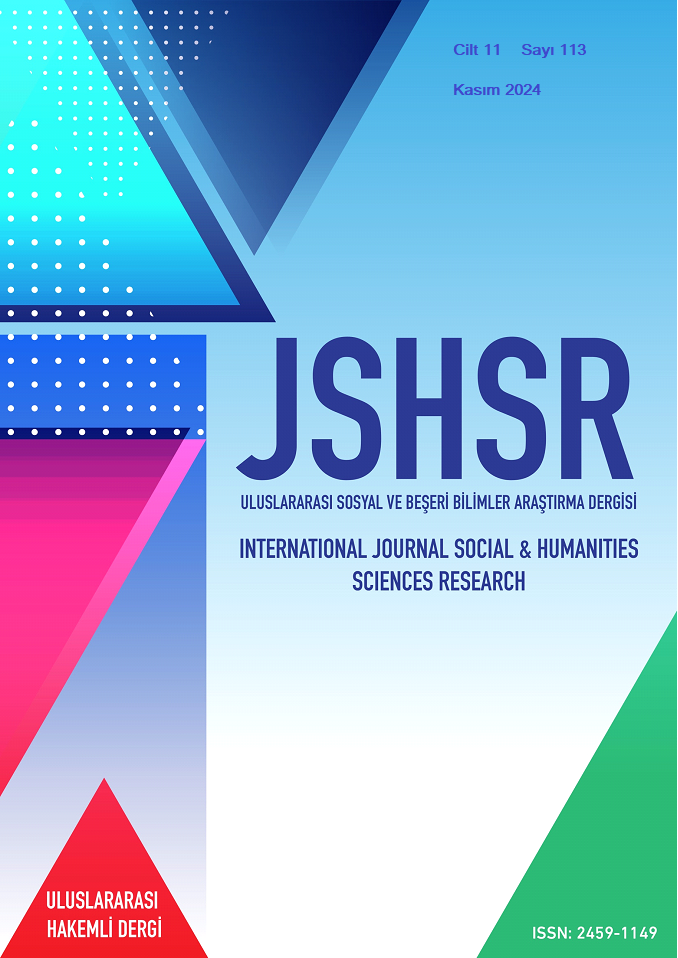Ortak Zihinsel Modellerin Öğrenci Başarısına Etkisi
DOI:
https://doi.org/10.5281/zenodo.14257209Anahtar Kelimeler:
Ortak Zihinsel Modeller, Öğrenci Başarısı, Eğitim, Grup Çalışmaları, İş BirliğiÖzet
Ortak zihinsel modeller, bireylerin belirli bir konu veya duruma dair benzer düşünsel temsillere sahip olmalarını sağlayan, grup içi iletişim ve iş birliği süreçlerinde önemli bir rol oynayan yapılar olarak tanımlanabilir. Bu çalışmanın amacı, eğitimde ortak zihinsel modellerin öğrenci başarılarına etkilerini literatür taraması yöntemiyle incelemektir. Literatür taraması, ortak zihinsel modellerin öğrencilerin öğrenme süreçleri, grup içi etkileşimler ve akademik başarıları üzerindeki etkilerini ele alan çalışmaları kapsamaktadır. Ortak zihinsel modellerin, öğrencilerin ders içi iletişim, iş birliği, problem çözme ve hedeflere yönelik uyum sağlama gibi becerilerini güçlendirdiği ve bu süreçlerin öğrencilerin akademik başarılarına olumlu katkılar sunduğu literatürdeki bulgularla desteklenmektedir. Ayrıca, ortak zihinsel modellerin grup çalışmalarındaki rolü, takım içi etkileşimleri iyileştirerek öğrenci başarısını artırmaya yönelik stratejilerin geliştirilmesine imkân tanımaktadır. Bu çalışma, eğitimde ortak zihinsel modellerin etkin kullanımını vurgulayarak, öğretim stratejilerinin öğrencilerin başarılarını artırmaya nasıl katkıda bulunabileceğini tartışacaktır.
Referanslar
Booth, A., Papaioannou, D., & Sutton, A. (2012). Systematic Approaches to a Successful Literature Review. SAGE Publications.
Boone, S. (2014). Using organizational learning to increase operational and conceptual mental models within professional learning communities. Journal of Psychological Issues in Organizational Culture, 5(3), 85–99.
Braun, V., & Clarke, V. (2006). Using thematic analysis in psychology. Qualitative Research in Psychology, 3(2), 77–101.
Cannon-Bowers, J. A., & Salas, E. (2001). Reflections on shared cognition. Journal of Organizational Behavior, 22(2), 195–202.
Chrispeels, J. H., Burke, P. H., Johnson, P., & Daly, A. J. (2008). Aligning mental models of district and school leadership teams for reform coherence. Education and Urban Society, 40(6), 730–750. https://doi.org/10.1177/0013124508319582
Cooke, N. J., Salas, E., Kiekel, P. A., & Bell, B. (2004). Advances in measuring team cognition. In E. Salas & S. M. Fiore (Eds.), Team cognition: Understanding the factors that drive process and performance (pp. 83–106). American Psychological Association.
Craik, K. J. W. (1943). The nature of explanation. Cambridge University Press.
Decuyper, S., Dochy, F., & Van den Bossche, P. (2010). Grasping the dynamic complexity of team learning: An integrative model for effective team learning in organizations. Educational Research Review, 5(2), 111–133. https://doi.org/10.1016/j.edurev.2010.02.002
Fink, A. (2019). Conducting research literature reviews: From the internet to paper (5th ed.). Sage Publications.
Hegarty, M., Stieff, M., & Dixon, B. L. (2012). Cognitive change in mental models with experience in the domain of organic chemistry. Journal of Cognitive Psychology, 25(2), 220–228.
Johnson, T. E., Top, E., & Yukselturk, E. (2011). Team shared mental model as a contributing factor to team performance and students’ course satisfaction in blended courses. Computers in Human Behavior, 27(6), 2330–2338.
Kitchenham, B. (2004). Procedures for performing systematic reviews (Technical Report No. 33). Keele University.
Klimoski, R., & Mohammed, S. (1994). Team mental model: Construct or metaphor? Journal of Management, 20(3), 403–437.
Lengfeld, J., Zalewski, T., & Shugar, L. (2024). Shared mental models as the framework for team role development: A grounded model of dynamics in student new venture teams. LEMEX Research Papers on Entrepreneurship, 6(1), 45-60.
Lycke, K. H., Grøttum, P., & Strømsø, H. I. (2006). Student learning strategies, mental models, and learning outcomes in problem-based and traditional curricula in medicine. Medical Teacher, 28(8), 717–722.
Mathieu, J. E., Heffner, T. S., Goodwin, G. F., Salas, E., & Cannon-Bowers, J. A. (2000). The influence of shared mental models on team process and performance. Journal of Applied Psychology, 85(2), 273–283.
Maynard, M. T., & Gilson, L. L. (2014). The role of shared mental model development in understanding virtual team effectiveness. Group & Organization Management, 39(1), 3–32.
Mohammed, S., Ferzandi, L., & Hamilton, K. (2010). Metaphor no more: A 15-year review of the team mental model construct. Journal of Management, 36(4), 876–910.
Nadkarni, S. (2003). Instructional methods and mental models of students: An empirical investigation. Academy of Management Learning & Education, 2(4), 335–351.
Ruff, W. G., & Shoho, A. R. (2005). Understanding instructional leadership through the mental models of three elementary school principals. Educational Administration Quarterly, 41(3), 554–577.
Sikorski, E. G., Johnson, T. E., & Ruscher, P. H. (2011). Team knowledge sharing intervention effects on team shared mental models and student performance in an undergraduate science course. Journal of Science Education and Technology, 21(5), 641–651. https://doi.org/10.1007/s10956-011-9353-9
Sunyono, S., Leny, Y., & Muslimin, I. (2015). Supporting students in learning with multiple representations to improve student mental models on atomic structure concepts. Science Education International, 26(2), 104–125.
Toader, A. F., & Kessler, T. (2018). Task variation and mental models divergence influencing the transfer of team learning. Small Group Research, 49(5), 545–575.
Torraco, R. J. (2005). Writing integrative literature reviews: Guidelines and examples. Human Resource Development Review, 4(3), 356–367.
Widmann, A., & Mulder, R. H. (2020). The effect of team learning behaviors and team mental models on teacher team performance. Instructional Science, 48(1), 1–21. https://doi.org/10.1007/s11251-019-09500-6
İndir
Yayınlanmış
Nasıl Atıf Yapılır
Sayı
Bölüm
Lisans
Telif Hakkı (c) 2024 International Journal of Social and Humanities Sciences Research (JSHSR)

Bu çalışma Creative Commons Attribution 4.0 International License ile lisanslanmıştır.


